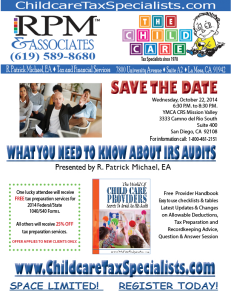 Just finished an article in Entrepreneur Magazine. It is a columnist sharing his experience and *lessons learned* going through an audit. He thought he kept good records, but discovered there is always room for improvement.
Just finished an article in Entrepreneur Magazine. It is a columnist sharing his experience and *lessons learned* going through an audit. He thought he kept good records, but discovered there is always room for improvement.
Every year I give seminars exclusively for the child care provider community through the YMCA Child Resource Services. The entire purpose of these seminars is to give providers the best tools and tips that will help maximize their deductions, and improve their record keeping skills.This year the Audit Seminar is on Wednesday, October 22, and includes a free workbook handout of our “Secrets to Survive an IRS Audit”.
Our Recordkeeping and Taxes Seminar is on Saturday, October 18 and will present you with the best practices for your special type of business. Some of the attendees even come back for a refresher course! Here are some of the key points J.D. Roth had on his list and our added comments. You can read the full article at http://www.entrepreneur.com/article/236412.
- Get help. Immediately hire a tax professional, even a tax attorney, to represent you. A pro will have a much better understanding of tax law and the audit process and can coach you on what to say and do. We urge calling us asap. (619) 589-8680. You want an EA or someone who understands your business, the IRS, and the way audits work.
- Don’t volunteer information. Be honest and forthcoming, but answer only what you’re asked. Don’t provide any more documentation than requested, as each additional piece of information is another chance to uncover errors. We talk about this too. Some poor souls have gone in and just rambled and rambled and discovered their audit suddenly became bigger and messy. If I’m handling your taxes – just call me the minute you get notified. If I’m not currently handling your taxes, give me a call. Also, go to naea.org. They will help you find an EA in your area.
- Don’t file a tax return during an audit. If you do, the audit could expand to include the new information. I received notice of the audit in late March, just before I was due to file my 2013 return. My accountant applied for an extension immediately. Consult a tax professional and follow their instruction.
- Get organized. As soon as you receive the audit notice, start gathering the requested information. This process will take longer than you think, especially if you’re like me and discover that some pieces are missing. It can take weeks to receive duplicate statements from your bank or broker. In our seminars we go over the best way to keep records. If you just follow the simple steps and practices we outline in our handbook, your less likely to get overwhelmed or panicked.
- Get it on paper. The IRS doesn’t deal with electronic files during an audit; only a paper trail will do. I learned the hard way that many financial institutions keep statements available online for download only for a few months. Now I print out all my statements as soon as they become available. We have written about this several times. Hard copies is the way to go. Thermal receipts – photocopy those puppies immediately. They fade. Read our Electronic Recordkeeping and the IRS,
- Be courteous. You may hate the IRS and resent the audit, but don’t take it out on the auditor. Be polite and professional. Imagine that you’re at a job interview, and act accordingly. Don’t test out any comedy routines you’ve been considering.
- Change your habits. It’s easier to get organized now than to create a new system under duress, like I did. After my audit, I adopted an embarrassingly simple step: I labeled a file folder “2014 taxes,” and I’ve been placing all the year’s financial documents there. This might work for individuals, but small businesses, specifically child care providers have a unique business (as defined by the IRS), and providers need to keep the best records possible. In our seminars, we go over those practices that work best.
